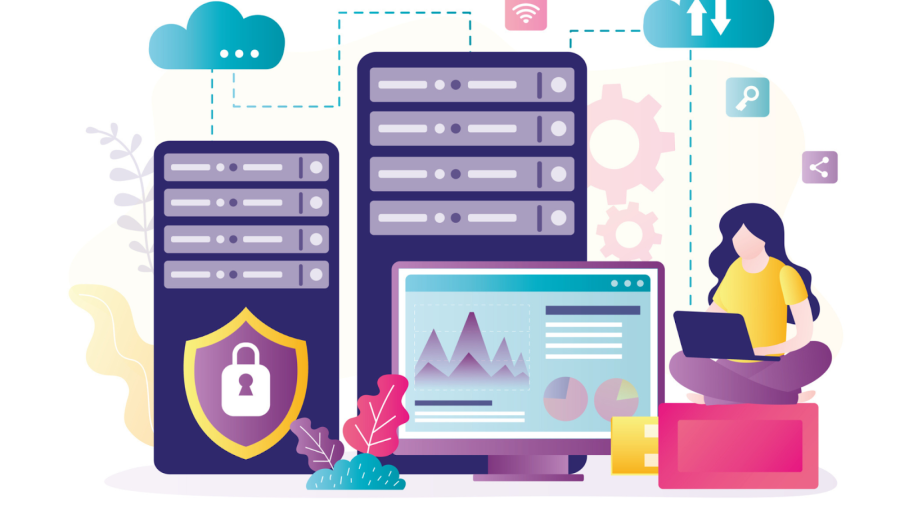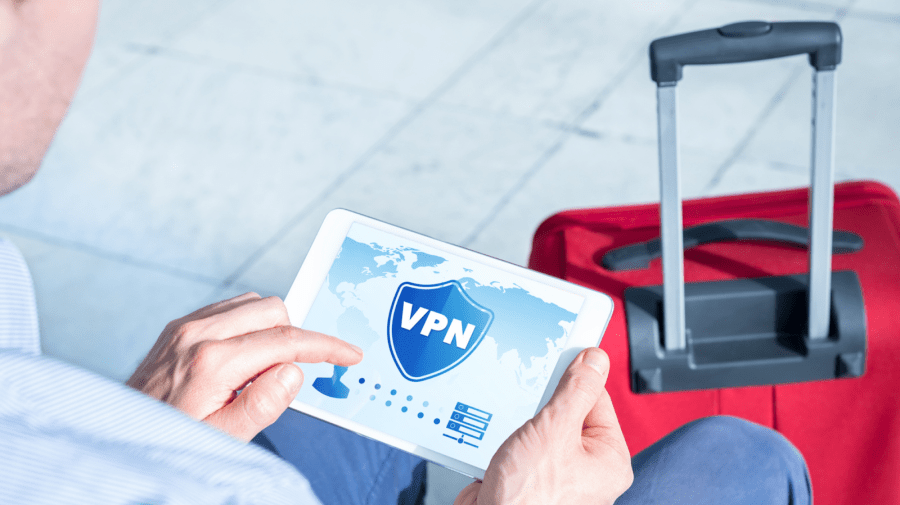
Using a VPN isn’t just a way to cover your digital tracks, but it’s also a means of preventing unwanted eyes from seeing your internet history and other sensitive information. When you travel, a VPN can be a life-saver if you value privacy. Here, we’ll delve into what a VPN is, how it works, the benefits or using one and the best VPN services for travel.
What Is a VPN? VPN Services, Explained
Most people don’t want to share everything they do on the internet with those around them — especially not strangers. Unfortunately, in some situations, just about anyone — government officials, an Internet Service Providers (ISPs) and cybercriminals alike — can access your information if they have the knowledge and resources to do so. So, how do you prevent these entities from accessing your data? That’s where VPN services come in.
VPN stands for Virtual Private Network; this technology grants you access to the internet via a secure, private connection. Think of it this way: Everyone who uses the internet leaves a digital trail of their online activities. This trail can let others know not only what websites you’ve visited, but it can also clue them in to any information you’ve stored online.
Often, your ISP and the people you share a WiFi hotspot with are predisposed to monitoring these activities. Thankfully, a VPN solves this problem by creating a secure access for you and you alone. More specifically, a VPN does the following:
- Changes your IP address
- Encrypts your internet activity
- Changes your physical location
- Creates a secure internet connection
How Do VPN Services Work?
A VPN service performs the functions above by encrypting data and routing your device requests through a virtual tunnel, all before accessing the internet. It serves as a barrier or intermediary between your device and the internet. That virtual tunnel implies that every time you send an internet request, the VPN runs the request through a virtual route and then through its private servers before sending it to the desired location. In essence, VPN services cover your tracks.
Pros of Using a VPN
- Online Safety: Encrypting your online activity with a VPN can ensure the safety of your confidential details like passwords and account information. It’ll also keep you safe from the purview of cyber criminals and prying ISPs.
- Anonymity: A VPN will cloak your true identity. Anonymity allows you to use public WiFi for any online activity without broadcasting the information to those around you on the same internet service.
- Exclusive Access: You can get exclusive access to any website, irrespective of firewalls or geo-blocking.
- Avoiding Discrimination: Anonymity helps you avoid any form of online discrimination because websites can’t ascertain your identity.
Cons of Using a VPN
- Slow Internet Speed: You might experience slow internet speed because your internet activity is encrypted. It’s almost like rerouting your trajectory through a different route.
- Cost: Authentic VPN services can be a little pricey. Not all VPNs provide the same services or quality, so prices may vary depending on your chosen service provider.
- Activity Logs: VPN services can sometimes keep a log of your encrypted online activity. Some of them are monitored by the government, while some sell this information to companies that need them.
Using VPN Services for Travel
Using VPN services while traveling is becoming a real necessity for people who want adequate internet protection while on the road. In addition to keeping your browsing history safe, a VPN will allow you to access content from anywhere in the world — that includes streaming show not available in your current location. Needless to say, many travelers feel VPN services are a must.

5 Best VPN Services for Travel
Looking to tap into all the benefits outlined above? Here are the best VPN services for travel.
IPVanish
IPVanish gives you the freedom to surf the web with privacy and peace of mind whenever you travel. The service providers built their network server infrastructure of about 2000 servers — all independently from the ground up.
This independence guarantees faster internet speed and greater information integrity for you, the user, when traveling. You can access IPVanish for just $3.99 per month with a year-long contract, and that comes with a 30-day risk-free guarantee on certain devices.
Pros
- Unmetered devices
- 24/7 customer support
- Fast connections
- No-logs policy
Cons
- U.S.-based, so may not work outside the U.S.
- Identified registration
ExpressVPN
ExpressVPN encrypts your network data using Advanced Encryption Standard with 256-bit keys (AES-256). Translation: nobody sees what you’re doing online no matter where you travel. Not to mention, this “military-grade” encryption ensures your anonymity for just $6.67 per month on a one-year plan. As an added bonus, a year-long ExpressVPN subscription grants you VPN access on all your devices, including routers.
Pros
- Quality military-grade encryption
- Vast server network
- Fast speed
- Multi-platform compatibility
Cons
- Pricey
NordVPN
NordVPN offers benefits based on the Nordic ideals of confidence, innovation and trust. You’ll get access to all geo-restricted content no matter your physical location. On a two-year plan, this one is just $3.99 per month. The best part? A single subscription can cover up to six of your devices.
Pros
- Cross-platform compatibility
- High Speed
- Top-notch security
- Low cost
- Kill-switch functionality
Cons
- Unwieldy on desktop
CyberGhost
CyberGhost gives a stronger layer of protection when it comes to online privacy, thanks in part to a strict no-log policy. That is, none of your online activity is stored on their platform — at all. One subscription covers up to seven devices and, on a two-year plan, comes in at $3.25 per month. The best part, though, is CyberGhost’s state-of-the-art server network, which guarantees solid internet speed regardless of where you are in the world.
Pros
- No-log policy
- User-friendly interface
- Ideal for quality video streaming
- Seven simultaneous connections
Cons
- Locations get crowded for connections
SurfShark
SurfShark truly really aims to enhance your online privacy, thanks to security features like the AES-256 and the company’s no-log policy. Best of all, SurfShark comes in at a great price point for travelers on a budget; you can use the VPN service on all your devices for just $2.49 per month if you choose a two-year plan.
Pros
- No-log policy
- Economical
- Limitless device usage
- AES-256 security
Cons
- Relatively slow






